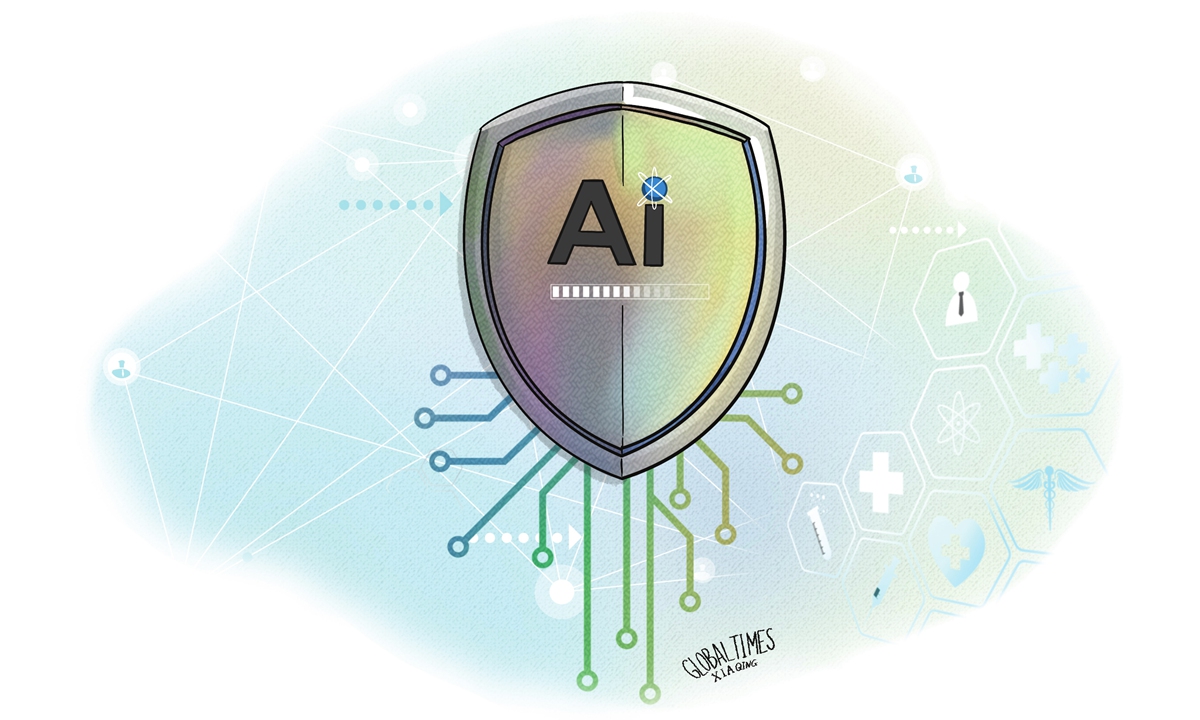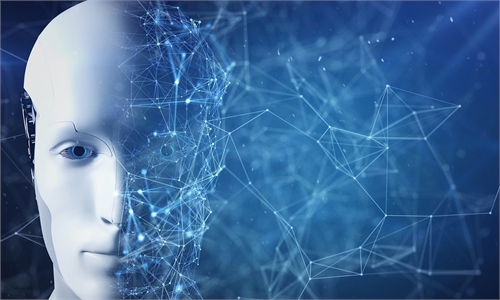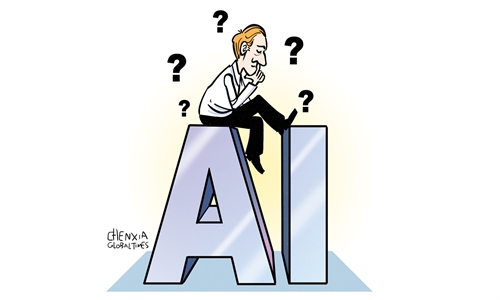
Illustration: Xia Qing/GT
Recent development and applications of Artificial Intelligence (AI) technology are too fast, and existing regulatory frameworks are very hard to keep pace with their speed. Much progress in AI technology, such as generative AI, has created more challenges than our society can solve in time. For example, generative AI-based synthetic disinformation has created a huge negative impact on trust on the internet and society and even poses a threat to global politics. In addition, since the current AI is still an information processing tool with many safety and security risks, misuse and abuse may pose catastrophic risks for humans. Effective technical and social mechanisms need to be implemented for the good of AI safety and security.Many branches of AI, such as Generative AIs are deeply incorporated with cultures since generated contents are based on contents from or in service of different nations and people from various cultures. Hence, modern regulations of AI have to be very inclusive and adaptable for regional and domestic considerations. At the same time, many AI industries and products are providing services globally, and they have to obey different regulatory frameworks when serving various countries and regions. Hence, interoperability among different regional regulatory frameworks is essential for globalization.
There are several intergovernmental organizations that aim to coordinate the development and regulations of AI, such as the OECD and Global Partnership on Artificial Intelligence (GPAI). These are all regional efforts, and currently not open and inclusive enough to serve as a truly global platform for global coordination due to their current policies for membership and participation. UNESCO's effort on Recommendations for Ethics in AI serves as the most inclusive work so far considering its global participation during the process of expert contributions and intergovernmental negotiations.
While at least two tracks of efforts need to be followed along UNESCO's efforts. First, with global agreement on its contents, concrete implementations of the recommendation in each country have to be followed and this should deserve global support. Second, conspirations need to be taken from this effort and extend its impact beyond the domains of education, science, and culture. From a more technical perspective, the International Telecommunication Union (ITU)'s series of efforts on AI for Good are important inputs for global dialogue. Many of the efforts from the International Organization for Standardization (ISO) on AI standards are not mandatory and mainly focus on technology, hence also serve as important foundations. Efforts from International Parliamentary Union (IPU) on ethics of Science and Technology serve as important policy inputs for global coordination.
Currently, there are no truly effective governance frameworks available for global coordination, which is very urgently needed to support good development and use of AI worldwide.
Efforts on AI governance from UNESCO, ITU, ISO, OECD, GPAI and others are generally fragmented governance efforts focusing on technical, social, or regional perspectives. More organizations that complement the upper efforts are expected to be set up, such as potential AI governance working groups under G20, BRICS, Shanghai Cooperation Organization (SCO), Belt and Road Initiative, and many more. Efforts are needed not only to bridge them together, but to reorganize their interconnections and extend their potential to a broader range to benefit the globe. A truly effective global governance framework needs a more systematic design both from the technical and social points of view.
The new and hopefully more effective global governance framework would have to incorporate existing fragmented governance efforts. From our point of view, the United Nations (UN) serves as the most appropriate intergovernmental organization that can bring together these various fragmented governance frameworks. UN Secretary-General António Guterres' reaction to a welcome for a new UN entity to support collective efforts to govern AI should be supported. Also as António Guterres argued, "the new entity should be inspired by models such as the International Atomic Energy Agency, the International Civil Aviation Organization, or the Intergovernmental Panel on Climate Change," while the mechanism for this new agency should be adaptive and flexible enough for new changes, not just to handle emerging near-term risks instantly and provide thought-provoking governance for long-term risks, to effectively coordinate and provide guidance for AI major powers, and most importantly, as inclusive as possible, leaving no one behind.
The new UN agency on AI should weave existing fragmented governance efforts into a global network on AI governance. From a risks avoidance perspective, the global network should coordinate and collaborate on global issues such as how to avoid AI's use of human limitations such as hate and unreasonable distrust, how to promote and ensure AI for international peace and security, and in the long-term, how to avoid catastrophic and existential risks created by AGI and Superintelligence.
These organizations are partially overlapping and nonhierarchical, hence the international governance mechanisms for AI are regime complex, with the UN as the hub of the network and each organization and effort has its own focus and complementary perspective to contribute to the global network on AI governance. The governance mechanism for the network is to some extent consistent with Orchestration. At least two levels of coordination are essential, one is how the UN coordinates efforts from different organizations, while the other is how these different organizations collaborate and coordinate with each other in a self-organized way. Since no one knows the future of AI and how it should be governed, a global experimentalist governance mechanism should be applied from a practical perspective. In addition to setting up regional hard laws and improve interoperability for domestic efforts, global exploratory experiments should be the expected model, and detailed governance should be subject to periodic revisions according to global practices.
The purpose of coordinating global AI governance is to promote its healthy development and use for the good of humanity. Hence, with a well-structured governance framework, in addition to coordinating domestic development and governance from the global perspective, this global network should promote AI for sustainable development, coordinating international resources to solve global issues such as biodiversity conservation, climate actions, cultural heritage and interactions, bringing quality education and good health to all. With a long-term vision, the aim of this global network should benefit global ecology and the community with a shared future for mankind.
The author is a professor and Director of the International Research Center for AI Ethics and Governance, Institute of Automation, Chinese Academy of Sciences. opinion@globaltimes.com.cn


